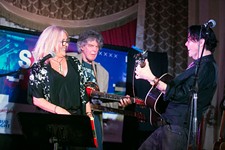Six Questions for Patricia Vonne
Patricia Vonne takes the bull by the horns.
By Jim Caligiuri, 12:06PM, Fri. Sep. 28, 2007
With her third record, Firebird (Bandolera), Patricia Vonne makes good on her potent Texas roots rock and San Antonio heritage. Because she’s fighting laryngitis this week, the singer-songwriter-actress wanted to save her voice for tonight's CD release party at the Continental Club, so we checked in via email.
Geezerville: Firebird opens with "Missing Women," which concerns the murder of hundreds of women in Juarez, Mexico. How did you become involved with the Juarez Project, which strives to shed light on this situation?
Patricia Vonne: When I was performing in Mexico City, I was given a documentary called Senoritas Extraviada by Lourdes Portillo. The graphic descriptions and extent of these inhumane murders haunted me. I traveled to Juarez and met with the mothers of some of the victims who let me in to their tragic world. I felt compelled to write "Missing Women" as a tribute to these innocent forgotten souls and help bring awareness to this ongoing tragedy.
G: Your music is a rather unique combination of Latino and Texas influences. Who are your biggest influences and how did they shape what you do?
PV: My earliest influence was my mother singing to my brothers and sisters in Spanish and teaching us to sing harmonies and instilling in us the importance of a second language. Also, my brother's record collection of the Cruzados, Lone Justice, Joe Ely, and Johnny Reno & the Sax Maniacs to name a few. To me, these artists were bigger than life and gave me the confidence to create my own style of music and inject that same excitement and cinematic flair that I felt listening to them for the first time. Being Mexican-American, I want to preserve the rich musical heritage of my hometown of San Antonio, which was an eclectic mix of Mariachi, rock, pop, rockabilly, Tejano, you name it.
G: Five of the songs on Firebird were co-written with your husband, Robert LaRoche. Describe the process of writing together.
PV: Generally speaking, when my husband and I write together he comes up with the music and I come up with the lyrics. "Battle Scars," "The Dogs Dance," and "Karolina" were written this way. Since we are always together on tour or at home, one of us is always working on a song. Songwriting is a collaboration and a process that sometimes leads to us disagreeing on which songs to start first.
G: You spend a lot of time touring Europe and I'm sure the traveling aspect of what you do is exciting. What are the audiences there like? Are they more appreciative than the audiences in the States?
PV: As one of my fans in Germany put it, "You Texans are not from another country, you are from another planet." They seem to have a genuine fascination with all things having to do with Texas, especially the films, music, and romanticism of the Old West. Austin has a fantastic reputation abroad because of our musical legacy. I see people at my gigs with Continental Club and Antone's shirts. They are indeed most curious and open-minded and it's up to you to win them over. Once you do, they are extremely loyal. They tend to be very respectful music listeners and won't make a sound until you finish your song. Then there's rowdy applause followed by total silence because they want to hear your every word and the story behind the song. I found the fans in Eastern Europe to be very enthusiastic as well. Last year we toured Poland and Lithuania and the kids went crazy. Seeing American rock 'n roll up close was really special to them.
G: I've been told that the song "Torera" was written in response to a less than favorable review that I wrote for your first CD. Is that true? It's a song about a female bullfighter. What prompted that image?
PV: What ignited the image of the female bullfighter was Pedro Almodovar's film Talk to Her, for she was the main character of his film. In a traditionally male arena, they are few and she is indeed an outcast. She personifies strength in adversity and defends her honor with her life. It's her attitude that helps her continue to forge ahead and fulfill her mission in life. Your review might have been the catalyst for the theme behind “Torera,” but I wanted this song to be empowering for anyone who deals with adversity. No matter what your profession, you will always have your detractors and can never please people 100% of the time.
G: How difficult is songwriting for you? Is it something you have to concentrate on or can songs come to you at almost any time?
PV: Personally, I like to start with a title. This gives me a firm idea of what I want to write about. For instance, "Jett Rink," my ode to James Dean and his character in the film Giant and "La Huerta de San Vicente," which was inspired by my visit to the house/ museum of Spanish poet Federico Garcia Lorca in Granada, Spain. When I'm on tour I spend many hours traveling in the van and I keep a journal of my experiences. It's not until I get home to Austin where I have the chance to decompress and let the flood gates open to songwriting. Sometimes a song comes fast and easy and other times it's like pulling teeth.
A note to readers: Bold and uncensored, The Austin Chronicle has been Austin’s independent news source for over 40 years, expressing the community’s political and environmental concerns and supporting its active cultural scene. Now more than ever, we need your support to continue supplying Austin with independent, free press. If real news is important to you, please consider making a donation of $5, $10 or whatever you can afford, to help keep our journalism on stands.










